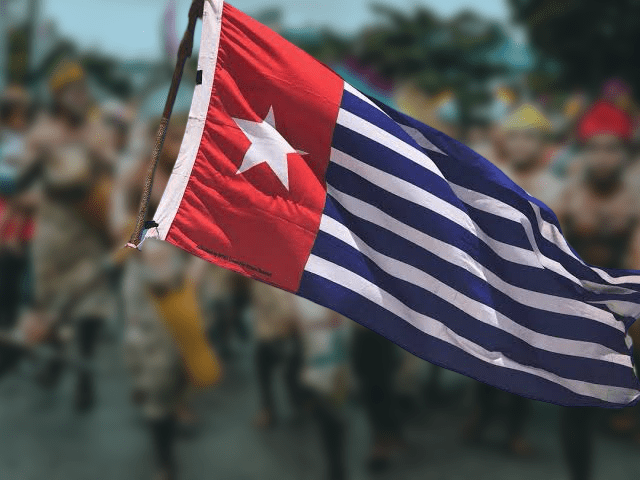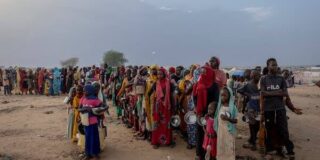
Hey everyone! ? Today, I want to chat about something that’s been on my mind for a while – the Grasberg Mine in West Papua, Indonesia. You may have heard of it; it’s the largest gold mine and the third-largest copper mine in the world, operated by Freeport-McMoRan. But beyond the shiny gold and copper, there’s a story of environmental devastation and cultural upheaval that’s crucial to discuss. So grab a coffee, and let’s dive into this complex situation!
West Papua, a resource-rich region in eastern Indonesia, has long been a site of ecological splendour and cultural diversity, home to over 250 indigenous tribes. Yet beneath its lush rainforests and vibrant traditions lies a troubling history of human rights abuses, many of which are intertwined with the exploitation of its natural wealth. For decades, allegations of violence, displacement, and suppression have plagued the region, often linked to land deals and resource extraction projects worth billions of dollars. Foreign corporations, drawn by West Papua’s vast reserves of gold, copper, timber, and palm oil, have played a significant role in this complex web of abuse, raising questions about accountability, complicity, and the cost of economic development.
West Papua’s struggles trace back to its controversial integration into Indonesia following the 1969 Act of Free Choice, a UN-supervised vote widely criticised as coerced and unrepresentative. Since then, the Indonesian government has maintained tight control over the region, often through a heavy military presence, citing security concerns over a persistent, though largely peaceful, independence movement. This control has come at a steep human cost for the indigenous population.
Reports from organisations like Amnesty International and Human Rights Watch paint a grim picture: extrajudicial killings, torture, arbitrary arrests, and forced displacement are distressingly common. Estimates suggest that between 60,000 and 100,000 Papuans have been internally displaced since violence escalated in 2018, with some citing figures as high as 500,000 civilian deaths over decades of conflict. Indigenous communities face not only physical violence but also the erosion of their rights to land, culture, and self-determination. Freedom of expression is stifled, with activists imprisoned for raising the Morning Star flag – a symbol of Papuan independence – or criticising Indonesian rule.
The Indonesian security forces, including the military and police, are frequently implicated in these abuses. Incidents like the torture of a Papuan boy with a snake in 2019 or the killing of five youths in Dekai in 2023 highlight a pattern of brutality and impunity. Investigations into such acts are rare, and when they occur, they often lack transparency or result in lenient sentences, leaving victims without justice.
Foreign corporations have become key players in West Papua’s human rights crisis, particularly through their involvement in resource extraction and large-scale agribusiness. The region’s natural riches – home to one of the world’s largest gold and copper mines, Freeport-McMoRan’s Grasberg operation, as well as vast timber and palm oil prospects – have attracted international investment. While these projects promise economic growth, they often come at the expense of indigenous rights and environmental integrity.
Freeport-McMoRan, a U.S.-based mining giant, exemplifies this dynamic. Operating in West Papua since the 1960s, the company has been accused of complicity in human rights abuses tied to its security arrangements. The Indonesian military has long provided protection for the Grasberg mine, and reports allege that payments from Freeport to these forces – sometimes millions of dollars annually – have fuelled abuses against local communities. Papuans living near the mine have faced displacement, environmental degradation from tailings dumping, and violent crackdowns when protesting these impacts. While Freeport denies direct responsibility, critics argue that its financial ties to the military create a permissive environment for such violations.
Beyond mining, foreign corporations in the palm oil sector have also drawn scrutiny. Companies from Malaysia, Singapore, and Europe have invested heavily in plantations across West Papua, often through subsidiaries or joint ventures with Indonesian firms. A year-long investigation by Al Jazeera’s 101 East revealed allegations of fraud and coercion in land deals, where indigenous tribes were pressured or misled into surrendering their ancestral lands for minimal compensation. These deals, worth billions, have led to deforestation and displacement, stripping communities of their livelihoods and cultural heritage. For example, in Merauke, the expansion of palm oil plantations has been linked to the marginalisation of the Marind people, with reports of high mortality rates and severe ecological harm.
The involvement of foreign corporations isn’t limited to direct operations. Many provide capital, equipment, or markets for these projects, indirectly supporting a system that prioritises profit over people. The lack of mandatory due diligence in many home countries allows these firms to operate with little accountability for the downstream effects of their investments.
The interplay between foreign corporations and human rights abuses in West Papua operates through several mechanisms. First, land acquisition often bypasses the principle of free, prior, and informed consent, a cornerstone of indigenous rights under international law. Communities report being coerced by local authorities or company representatives, sometimes under military oversight, to sign away their land. This leaves them vulnerable to displacement and poverty, as traditional hunting, fishing, and farming grounds vanish.
Second, the presence of security forces to protect corporate assets amplifies the risk of violence. The Indonesian military’s dual role – suppressing dissent and safeguarding economic interests – means that protests against land grabs or environmental damage are met with force. Foreign corporations, by relying on this protection, become enmeshed in a repressive apparatus, even if they don’t directly order the abuses.
Third, weak governance and corruption exacerbate the problem. Indonesia’s regulatory framework often favors corporate interests, with officials allegedly facilitating land deals for personal gain. Foreign companies, knowingly or not, benefit from this lax oversight, operating in a region where impunity is the norm.
The situation in West Papua underscores a global challenge: how to balance economic development with human rights in resource-rich, conflict-prone regions. Foreign corporations wield immense influence, yet their role in perpetuating abuses often goes unchecked. The international community has taken notice – UN experts have repeatedly called for independent investigations and humanitarian access – but progress is slow. Indonesia’s restrictions on journalists and NGOs make it harder to expose these issues, while its non-membership in the International Criminal Court limits legal recourse.
For meaningful change, several steps are needed. Foreign corporations must adopt rigorous human rights due diligence, ensuring their operations don’t harm local communities. Home governments, like the U.S. and EU nations, could enforce stricter regulations on companies operating abroad, tying investment to accountability. Indonesia, meanwhile, must strengthen its National Human Rights Commission and allow transparent investigations into abuses, as urged by UN bodies in 2024 reviews.
For West Papuans, the stakes couldn’t be higher. Their struggle is not just against local forces but a global economic system that too often sees their land as a commodity and their rights as expendable. Until foreign corporations and their host governments prioritise justice over profit, the ecological haven of West Papua will remain a battleground for human dignity.
Environmental Catastrophe
First off, let’s talk about the environment. The Grasberg Mine has a jaw-dropping environmental footprint. Imagine this: every day, it dumps up to 230,000 tonnes of waste – yes, you read that right – into the Aikwa River system. This practice is known as riverine tailings disposal, and it’s wreaking havoc on what used to be pristine rivers. These once-clear waterways are now murky, metal-laden channels, which is a death sentence for aquatic life. Local communities, like the Kamoro and Amungme tribes, have seen their fish and shrimp populations plummet. For generations, these tribes have relied on these waters for food and trade, and now? They’re facing a crisis.
But it’s not just the rivers that are suffering. The lush forests of West Papua, including parts of the stunning Lorentz National Park – a UNESCO World Heritage site – are being decimated. Studies have shown that over 13,000 hectares have been destroyed or degraded due to tailings. And let’s not forget about the waste rock that leaches heavy metals into the groundwater and rivers. This pollution is like a slow poison, creating long-term damage that’s incredibly hard to reverse. While Freeport claims the impact is manageable and has government approval, many critics argue it’s nothing short of an ecological disaster. West Papua’s rainforest is one of the last great wildernesses on the planet, and we’re watching it slip away.
Cultural Erosion
Now, let’s shift gears and talk about the cultural impact. The Amungme people hold the Grasberg mountain sacred; they see it as the “head of their mother” in their cosmology. To them, the excavation of this mountain is not just about land – it’s a violation of their spiritual connection to the land. And what about the Kamoro people? They’ve lost traditional fishing and sago-gathering grounds to the mine’s tailings, erasing practices that have defined their identity for centuries.
The social fabric of local communities has also been shaken. The influx of miners and military personnel – Freeport has reportedly paid millions to Indonesian forces for security – p has led to significant changes in village life. Places like Banti have seen bars and brothels pop up, bringing in outsiders and clashing with traditional values. This disruption has led to a public health crisis, with HIV rates in the area soaring to 15 times higher than the national average. Many locals attribute this to the upheaval caused by the mine.
It’s heartbreaking to see that despite the billions generated from the mine, poverty in West Papua remains the highest in Indonesia. Indigenous Papuans often feel sidelined, witnessing their land and culture being exploited while they face displacement and loss.
Historical Context
The history of the Grasberg Mine is also tied to the political landscape of West Papua. Since Indonesia took control of the region in 1969, many critics have labeled this move as a resource grab. Freeport signed its first deal with Suharto’s regime back in 1967, long before the region’s status was even settled. The military presence has been heavy, and it’s estimated that up to 500,000 West Papuans have died in conflicts since then. Groups like the Free Papua Movement see the mine as a symbol of exploitation, while Freeport argues that it brings jobs and infrastructure, like schools and clinics. However, many locals feel these offerings are inadequate when weighed against the cultural and environmental toll.
Wrapping Up
So, where does this leave us? The situation at the Grasberg Mine is a tangled web of economic gain for some versus existential loss for the indigenous people and their land. It’s a stark reminder that the pursuit of wealth often comes at a significant cost to both the environment and the cultural heritage of communities.



